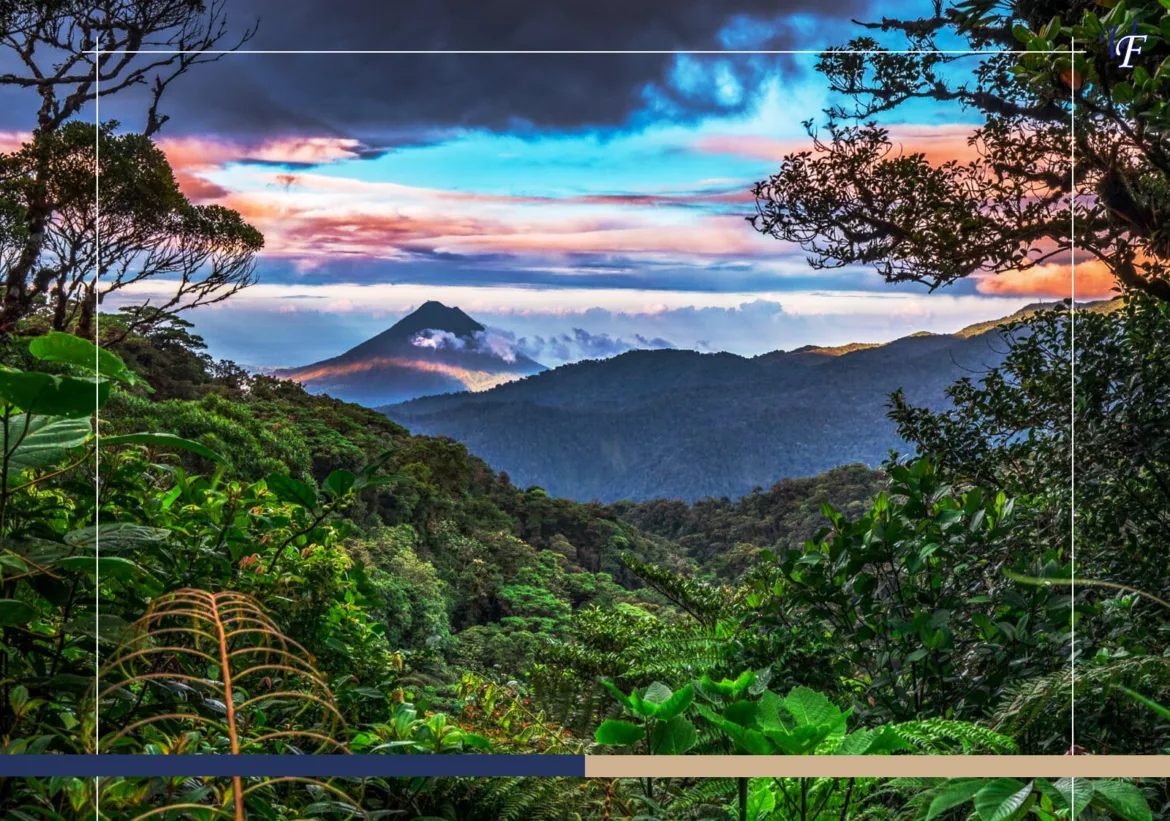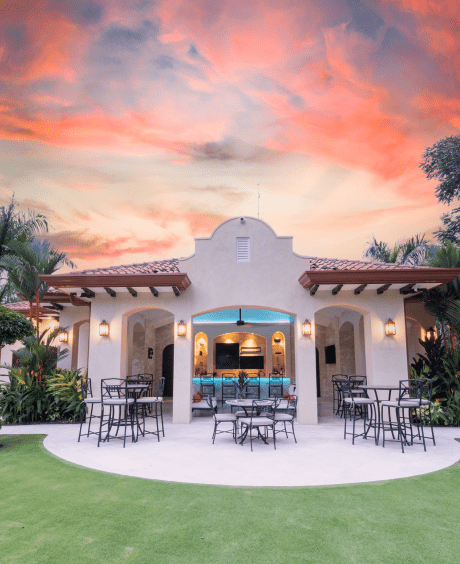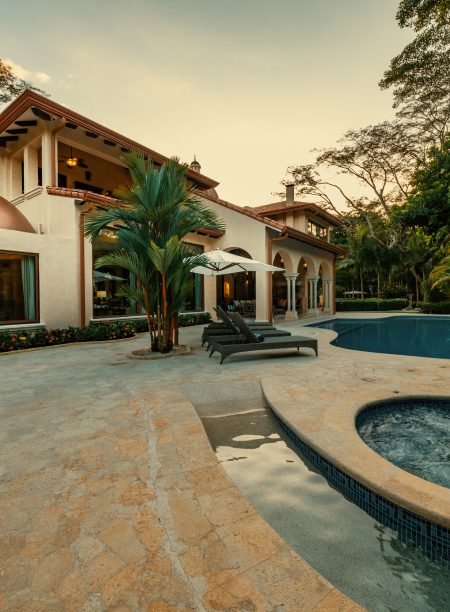Costa Rica, often celebrated for its breathtaking natural landscapes and abundant biodiversity, is a country that also boasts a vibrant and diverse cultural tapestry. Beyond its lush rainforests and pristine beaches, this Central American gem offers travelers a unique opportunity to immerse themselves in its rich heritage and gain a deeper understanding of its people.
While the country’s natural beauty is undoubtedly captivating, exploring its cultural treasures can provide an equally enriching and memorable travel experience. This blog aims to unveil the best places to visit in Costa Rica for those seeking an immersive answer to the question- What is the culture of Costa Rica? So, without any further ado, let’s explore the best places to visit here for cultural experiences.
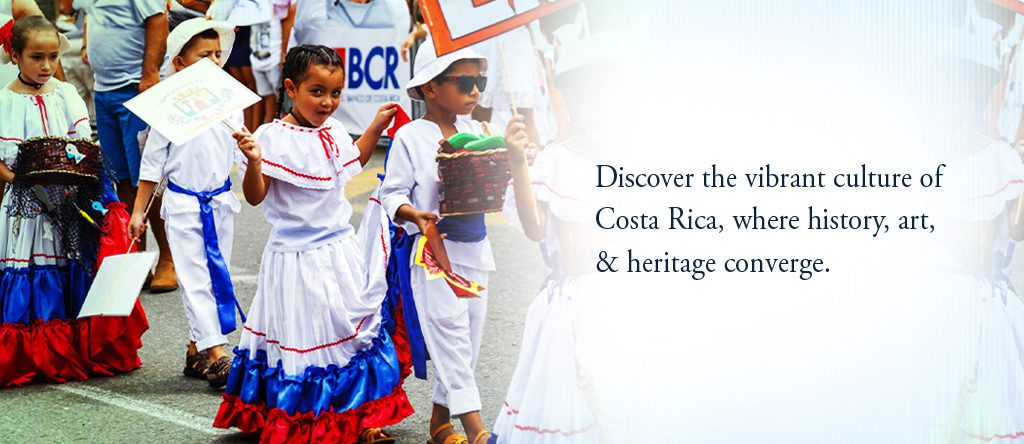
The Capital City San José
Nestled between verdant mountains with the best places to enjoy hiking in Costa Rica and bustling urban life, San José is the beating heart of Costa Rica’s culture trip. This lively city represents the heart of the country as its capital, bringing together the essence of San José, the contemporary and cultural elements of the nation. It provides an intriguing opportunity to explore the city’s past and cultural significance.
Iconic Landmarks, Museums, and Art Galleries
- The National Theater: An architectural gem built in the late 19th century; the National Theater symbolizes the appreciation for Costa Rican arts. Its ornate interiors and exquisite performances transport visitors to a bygone era of elegance and sophistication.
- Museum of Pre-Columbian Gold: This museum boasts an impressive collection of over 1,600 gold artifacts, showcasing the craftsmanship and spirituality of indigenous San José Costa Rica culture.
- Jade Museum: Home to the world’s most extensive collection of American jade, this museum provides insights into the cultural significance of jade in ancient civilizations.
- Costa Rican Art Museum: Housed in a former military fortress, this museum showcases the evolution of Costa Rican art, featuring a diverse range of works from colonial to contemporary periods.
Recommendations for Experiencing Local Cuisine and Traditional Markets
- Mercado Central: Dive into the heart of local life by exploring Mercado Central. This bustling market offers a sensory overload of sights, sounds, and aromas, with stalls selling fresh produce, crafts, and delectable street food.
- Soda Restaurants: You should add a sampling of the traditional Costa Rican diet in eateries known as “sodas” in your travel itinerary to Costa Rica. From the iconic Casado (a balanced meal of rice, beans, meat, and plantains) to Gallo pinto (rice and beans), these restaurants reflect the country’s culinary heritage. Some famous soda restaurants include- Soda Tapia, Soda La Tica, and Soda y Mirador La Guaria.
Ongoing Cultural Extravaganzas: Festivals and Events
Costa Rica’s culture trip vibrancy does not limit to its historical sites and museums; it extends through various festivals and events throughout the year. These occasions give visitors an immersive experience of the top Costa Rica traditions, music, dance, and diverse heritage.
- Fiestas de Zapote: Held at the end of December, this traditional fair features bullfights, live music, and carnival rides, offering an immersive experience of the vibrant culture of the country.
- Día de San José: Celebrated on March 19th, this holiday honors the patron saint of San José with parades, processions, and religious ceremonies.
- International Arts Festival: This festival transforms the city into a vibrant hub of artistic expression, featuring music, theater, dance, and visual arts worldwide.
Cartago – The Ancient Capital
Cartago holds a significant place in the history of Costa Rica as its former capital, dating back to the colonial era. Founded in 1563, Cartago was the country’s political, cultural, and religious center for centuries. Its historical importance is deeply intertwined with the nation’s development, making it a captivating destination for those intrigued by the past.
Cartago’s Evocative Historical Sites
- Basilica of Our Lady of the Angels: This is one of the most revered religious sites in the country. The story of La Negrita, a small statue of the Virgin Mary believed to have performed miracles, is intimately connected with the basilica. Pilgrims from across the country visit to pay homage to this religious icon and experience the profound spiritual atmosphere.
- Ruins of Santiago Apostol Parish: These ruins are remnants of the original Santiago Apostol Parish, once a cornerstone of Cartago’s colonial architecture. The ruins offer a window into the past, allowing visitors to imagine the city’s former grandeur and appreciate the historical layers that have shaped the country.
Cartago’s Reverent Religious Gatherings
- Romería: An annual pilgrimage to the Basilica of Our Lady of the Angels, Romería is a significant event where devotees walk to Cartago from various parts of the country to express their faith and gratitude.
- Virgen de Los Ángeles Festival: Celebrated on August 2nd, this festival honors the Virgin Mary with processions, traditional dances, music, and local delicacies. It’s a lively showcase of Cartago’s solid religious identity.
Cartago’s Natural-Cultural Allure
- Irazú Volcano: The moon-like terrain and the vibrant green crater lake uniquely blend natural beauty and geological wonder.
- Orosí Valley: This picturesque valley, located near Cartago, is known for its coffee plantations, charming colonial churches, and lush scenery.
- Tapantí National Park: For those seeking a deeper connection with the exotic flora and fauna of Costa Rica, Tapantí National Park offers hiking trails through cloud forests, rivers, and waterfalls.
Puerto Limón
Puerto Limón stands apart as a captivating destination that pulses with Afro-Caribbean vibrancy. The region’s rich history is deeply rooted in the African diaspora. It has infused Puerto Limón with a unique cultural tapestry, from its lively music and dance traditions to its flavorful cuisine and festive celebrations.
Immersing in Calypso’s Rhythmic Melodies
Puerto Limón is a hotspot for the lively rhythms of Calypso music and the energetic dance moves of Limbo. Born out of African traditions, Calypso blends with Caribbean melodies to create a soulful and infectious sound. The Limbo, a dance where participants glide under a horizontal pole, showcases the region’s joyful spirit and a strong sense of community.
Vibrant Markets and Afro-Caribbean Cuisine
Exploring Puerto Limón’s bustling street markets is a sensory adventure. Vendors peddle exotic fruits like guava, starfruit, and plantains alongside colorful textiles and crafts that reflect the vibrant local culture.
Puerto Limón’s Colorful Street Markets
- Exotic Fruits Galore: Dive into a sensory feast with stalls piled high with tropical fruits like guava, mangoes, and plantains.
- Textile Treasures: Discover vibrant textiles and crafts that showcase the region’s artistic flair.
- Local Artisans: Engage with skilled artisans offering unique handcrafted items that reflect the Afro-Caribbean spirit.
Authentic Afro-Caribbean Cuisine
- Coconut-Infused Delights: Indulge in dishes featuring coconut flavors, like coconut rice and beans.
- Jerk-Inspired Creations: Experience the bold, spicy, jerk-spiced meats and seafood flavors.
- Seafood Specialties: Delight in the day’s catch, prepared with a touch of Afro-Caribbean culinary artistry.
Puerto Limón’s Lively Festive Traditions
- Carnival de Limón: This annual carnival is a highlight for locals and visitors. The streets burst with colors, vibrant costumes, and exuberant parades celebrating the region’s Afro-Caribbean identity.
- Dia de La Raza: Celebrated on October 12th, this holiday commemorates the diverse heritage of the Caribbean region. Festivities include cultural performances, traditional foods, and educational activities emphasizing unity and respect for different backgrounds.
- Dia de La Cultura: On October 26th, this day celebrates Puerto Limón’s unique cultural identity. This festival sparks its spirit with artistic showcases, traditional music, and opportunities to engage with local artists, writers, and musicians.
- Afro-Caribbean Music and Dance Festivals: Throughout the year, Puerto Limón hosts various music and dance festivals that pay homage to Afro-Caribbean traditions. These events provide the best time to experience the vibrant fiestas of Costa Rica.
Puerto Limón is a celebration of diversity and a testament to the lasting influence of Afro-Caribbean heritage. A visit to Puerto Limón promises an unforgettable journey into the heart of Afro-Caribbean culture.
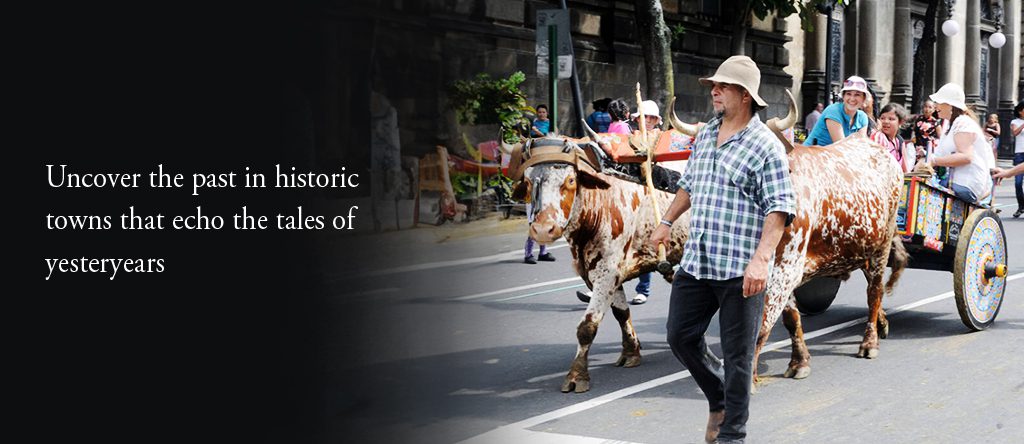
The Nicoya Peninsula’s Blue Zone and Indigenous Heritage
The Nicoya Peninsula is not just a destination of pristine beaches and lush landscapes; it also enlists as one of the world’s five Blue Zones. These unique areas have drawn attention for their exceptional longevity rates and residents’ remarkable health and vitality.
Traditional Practices of the Centenarians and Their Impact on the Culture
The centenarians of the Nicoya Peninsula attribute their longevity to a blend of cultural practices, lifestyle choices, and the region’s supportive community. These practices include a diet rich in fresh fruits, vegetables, and beans, a strong sense of purpose, regular physical activity, and deep social connections.
Chorotega Indigenous People and their Crafts
The Nicoya Peninsula is also home to the Chorotega indigenous people, who have inhabited the region for centuries. These communities have preserved their unique cultural heritage through crafts, pottery, and artwork. Visiting their villages offers a chance to witness their artistic skills firsthand and learn about the top Costa Rica traditions, spirituality, and way of life that remain intertwined with the land.
For those eager to dive deeper into the cultural richness of the Nicoya Peninsula, homestays offer an unparalleled experience. Sharing everyday life with local families lets you witness their routines, traditions, and values firsthand. It’s a chance to foster meaningful connections and gain insights that tourist attractions can’t provide.
Homestay Options
- Casa Pueblo Homestay: Engage in daily activities, from cooking to storytelling, while living amidst the vibrant culture of the peninsula.
- Vida en Familia Retreat: This program offers an immersive homestay experience, providing you with an opportunity to engage with the daily lives of families, participate in traditional activities, and contribute to community projects.
- Pura Vida Homestays: Focusing on sustainability and cultural exchange, they offer a chance to connect with local families, learn about their lifestyles, and contribute to their communities.
Monteverde – Quaker Influence and Sustainability
In Monteverde, the Quaker community has played a significant role in shaping the local culture. Their values of simplicity and cooperation have left a positive mark on the town’s way of life. Monteverde takes eco-friendliness seriously. Sustainable practices like reforestation and waste reduction make it a shining example of environmental responsibility.
Sustainable Practices and Eco-Tourism Initiatives
Monteverde’s commitment to sustainability and eco-tourism is evident in various eco-tourism initiatives. These efforts ensure that the region’s natural wonders remain for generations.
Examples of Sustainability
- Rainforest Preserves: Monteverde boasts protected rainforests, preserving unique flora and fauna.
- Carbon Neutrality: Some lodges practice carbon neutrality, minimizing their environmental impact.
- Waste Reduction: Recycling and composting are practices for reducing waste’s ecological toll.
- Educational Tours: Visitors learn about conservation’s importance and are encouraged to make a positive impact.
Engaging with Monteverde’s Community and Culture
Monteverde doesn’t just welcome tourists; it invites them to be part of its vibrant tapestry. Costa Rica cultural tours and workshops provide opportunities for meaningful connections.
Engaging Cultural Experiences
- Coffee Tours: Dive into Monteverde’s coffee culture, from harvest to cup.
- Cheese Making Workshops: Learn the art of cheese-making from local artisans.
- Homestays: Immerse yourself in local life through family homestays.
- Music and Dance Workshops: Discover the rhythms of Monteverde’s traditions through interactive workshops.
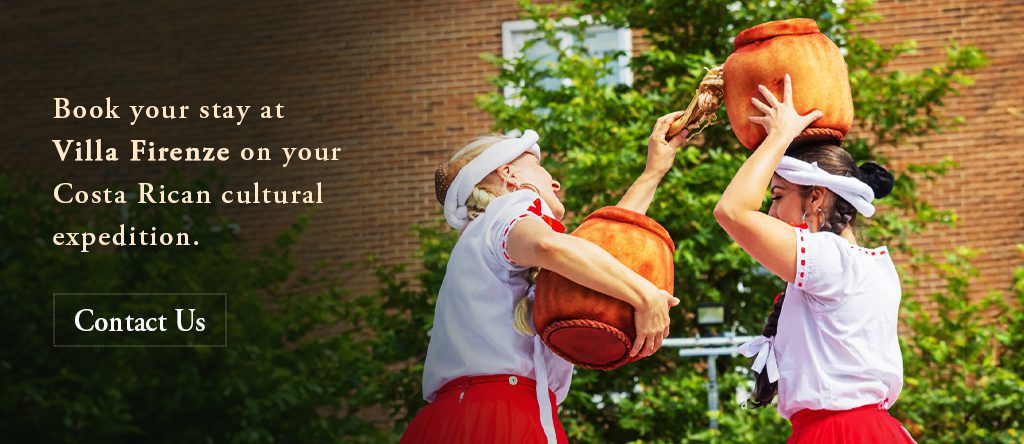
Conclusion
Costa Rica is a nation that thrives on its rich cultural diversity, where every region unfolds a unique story that contributes to the country’s vibrant tapestry. As you traverse on Costa Rica cultural tours, remember that the true essence of natural beauty lies not only in its breathtaking landscapes but in the stories of its people, the melodies of its music, and the flavors of its cuisine.
Each corner of this nation is an open invitation to embrace new perspectives, forge connections, and appreciate the mosaic of cultures that form the identity of this Central American country. So, embark on this journey of cultural exploration and let the diversity inspire you, leaving you with cherished memories and a deeper understanding of this captivating land.





